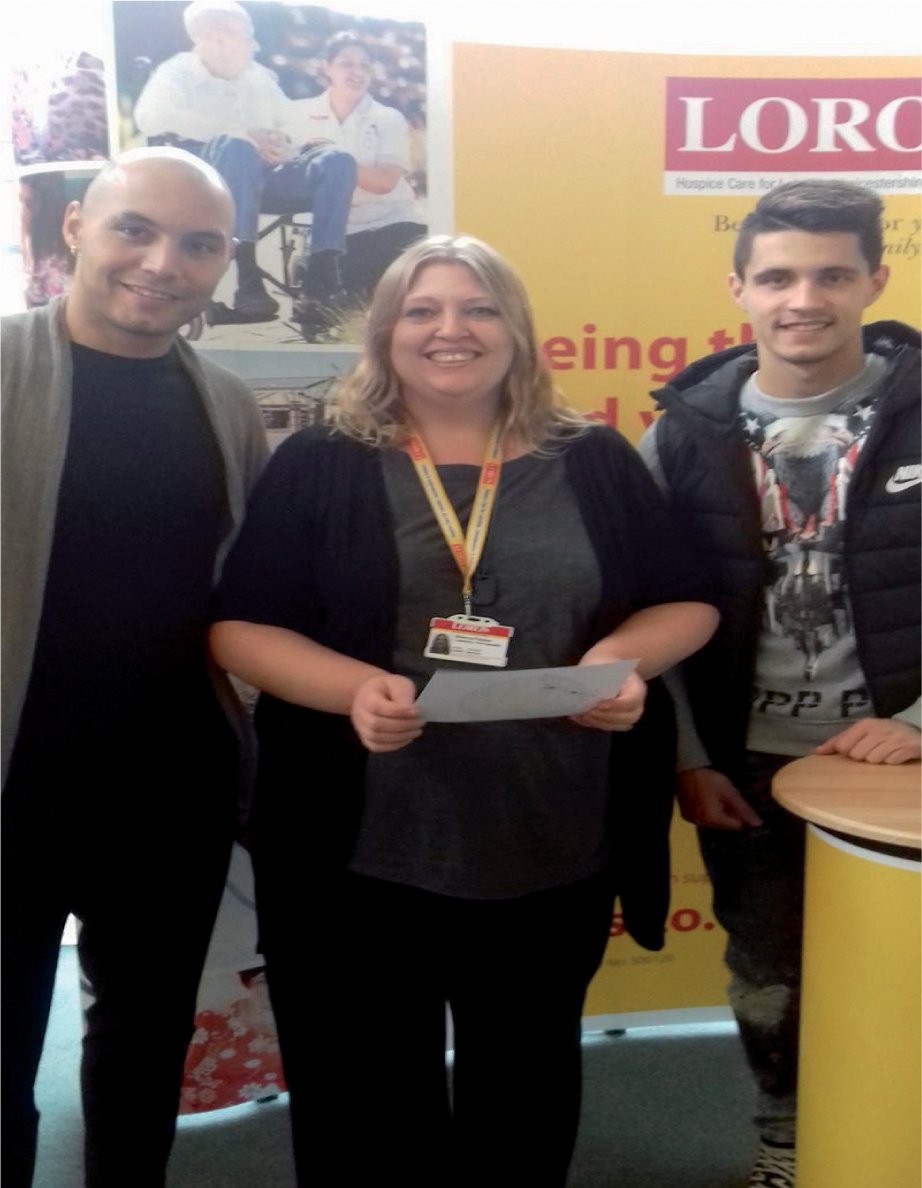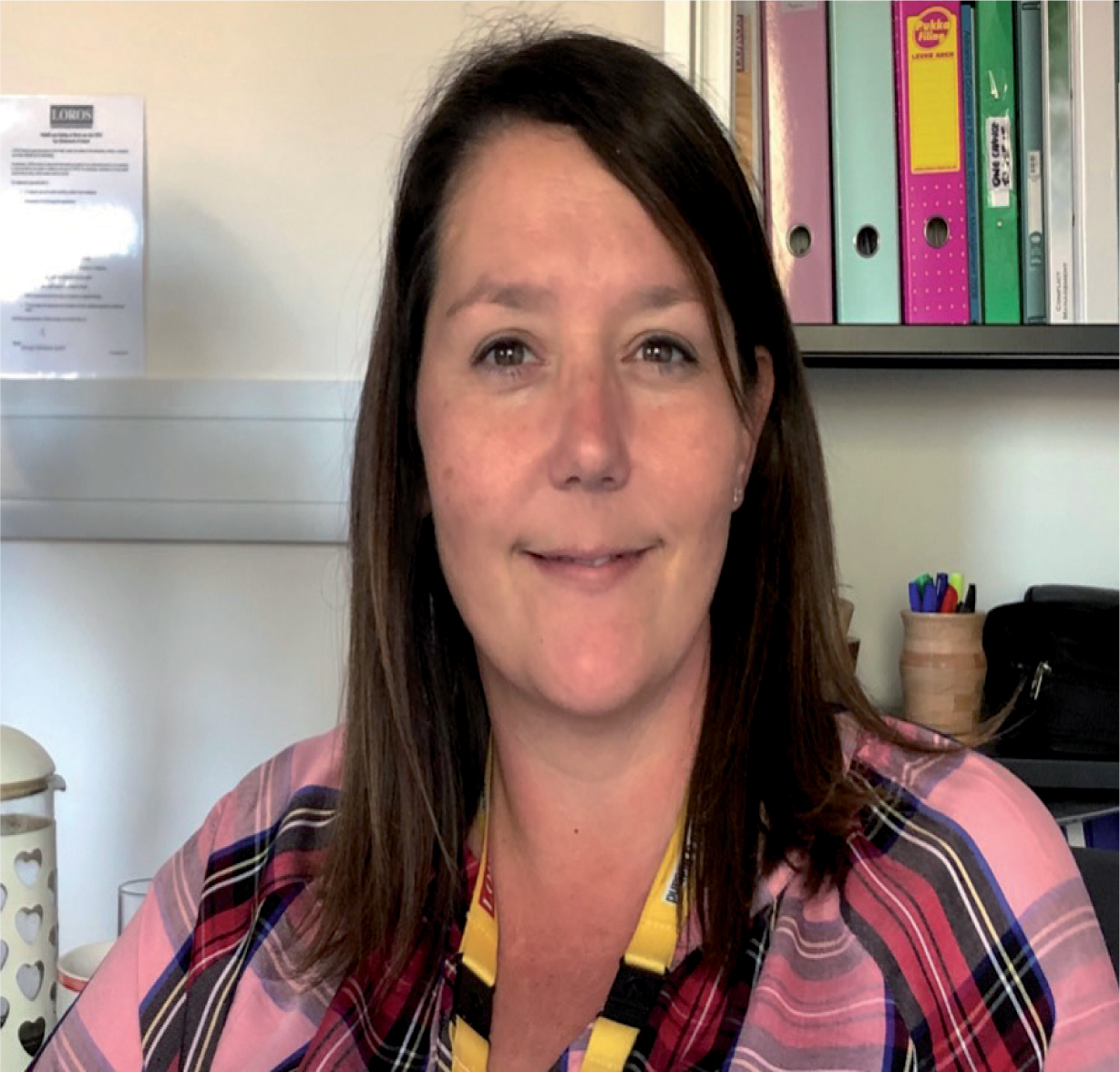LOROS Hospice provides free, high-quality, compassionate care and support to terminally ill patients, their family and carers, both at the hospice and in patients' own homes. Its community nursing team delivers palliative care to around 2500 individuals a year across Leicester, Leicestershire and Rutland. This article describes the experiences of two individuals who work in community care at LOROS.
Becky Paulson
Community Nurse Specialist at LOROS Hospice
Becky Paulson has been working at LOROS Hospice for 8 years. It is only the second job she has held since she qualified in 1995. Her first role after completing her nursing degree at Leicester's De Montfort University was as a nurse in the oncology department at Leicester Royal Infirmary, where she spent 13 years. Becky worked with acute cancer patients and developed a passion for working in palliative care.
She decided to apply for the job as a specialist community nurse at LOROS Hospice after shadowing a Macmillan nurse during a training day. While she found the day extremely sad, she realised that working in end-of-life care was the career for her.
Her role at LOROS involves supporting patients who have received a palliative diagnosis in their homes. Her patients are mainly people with terminal cancer, but she also has patients with terminal heart disease and lung disease. Additionally, she has recently been working with a patient with end-stage dementia. Becky also provides support for families and works with other agencies and healthcare providers, where appropriate, to deliver a tailored care programme.
One of the things she loves most about her role is getting to know the patients. Becky says:
‘I was attracted to working at LOROS as I really wanted a role where I could develop relationships with patients and help them be as comfortable and as pain free as possible and enable them to stay in their home environment.
‘I find it really rewarding to build up trust with a patient. When I first go into someone's home, I'm a stranger. I find it amazing that people invite me into their homes and will run through very personal things, so that I can understand what they need to manage their condition. By the end of my first visit, we usually have a strong bond of trust’.
Becky highlights that the key attributes of a community nurse working in palliative care are being caring, being able to listen and having excellent communication skills. She says:
‘When we first meet a patient, we have to build up a picture quickly and investigate their condition and their emotional side. We put the pieces together and prepare a plan of support for a patient, which is why listening and communication are core skills’.

Becky's role is autonomous, and she has her own caseload. This means she can plan her day visiting the patients who need her, rather than being told where to go. One of the key benefits for patients of a LOROS community nurse is they are not so restricted on time. Often district nurses do not have the capacity to spend a lot of time with patients. Becky, on the other hand, says that she can sometimes spend up to 2 hours with a patient if that is what is needed.
Becky is also part of an integrated care system, and she works closely with other healthcare providers to ensure that the patient gets the full support available. The overall person in charge of care is the patient's GP. Following a referral to her team, Becky will usually try to meet with the GP to discuss the care needed. She will also keep the GP up to date on the care plan she is implementing.
Similarly, Becky will link up with district nurses too. She can prescribe medications, but it will be the district nurse who will deal with setting up a syringe driver to administer any drugs, for example. The Hospice Home Team may also get involved, but usually, this is towards the final days of a patient's life if their needs are complex.
Some GPs in the area operate a Gold Standard Framework. This is used by many GP practices, care homes and hospitals to enable earlier recognition of patients with life-limiting conditions and help them plan to live as well as possible right to the end.
For Becky, this means attending regular meetings with GPs and district nurses to discuss a patient's care. Multidisciplinary team meetings are also held at LOROS. Becky says these meetings are particularly useful for getting other people's opinions on treatments or to discuss any issues she may be having with a patient. Becky says:
‘In our area we work with other agencies and health providers to ensure patients have access to the best support. This generally works well, although there are challenges as we are a really overstretched service, as are the GPs and district nurses’.
Being a community nurse can be a difficult job emotionally. Becky points out that most nurses come into the role to make people better. In her role, she knows this is not going to happen. She says,
‘The most difficult thing to get your head round is that you can't fix or cure someone. This doesn't get any easier; we just learn to deal with it better. Sometimes you can find you get really upset about patients. Some you really connect with but then I realise all I can do is make their last few months, weeks or days that bit better. For me, this can be heart breaking’.
When asked what makes LOROS a unique and place to work, Becky highlights that the entire team is hugely supportive. The structure makes it easy to approach management and consultants, and everyone is on first-name terms. Becky says,
‘Only the other day I needed a consultant to come out with me to see a patient. I asked someone and the next day he made himself available to come with me. The consultants and the entire team are there to help each other and they are amazingly supportive’.
To help community nurses deal with the emotional side of the job, LOROS also provides a counselling service. Becky says, at first, she was sceptical about this and felt she did not need it, but she attends every session now and has found it incredibly useful.
Other benefits of working at LOROS include the many training and learning opportunities available for staff. There is an in-house education department, and staff can choose to go on courses that are relevant to their jobs. Becky has completed a prescribing course, which took 10 months. During this time, LOROS supported Becky in providing a day off each week to attend the course and 120 extra hours of study time. She is also attending a palliative care conference in June organised by Macmillan in London. LOROS is keen for staff to keep up to date on the latest treatments and trends. Team members attending courses and conferences are encouraged to share any learning at team meetings, and they sign a ‘learning contract’ to say they agree to do this.
Becky highly recommends LOROS for nurses wishing to work in palliative care in the community. She says the job is challenging, but the rewards are immense. She concludes,
‘The patients are always a real inspiration to me. They must deal with pain and the emotional side of dying. It's a privilege for me to help them and make sure their final days are as comfortable as possible’.
Dan Smeeton
Community Outreach Lead at LOROS Hospice
Dan has been working at LOROS Hospice for 18 months. Considered a relatively new member of the team (some have been there 30 years), she greatly enjoys her role and says she will not be going anywhere else anytime soon.
Dan has a health studies degree from Manchester Metropolitan University. Since graduating, she has worked in adult social care in the public sector, for Age UK in the voluntary sector and in domiciliary care in the private sector. She was attracted to LOROS Hospice because of its reputation and innovative approach to care. Dan says
‘We use virtual reality with patients, which is really unusual and different. We also fulfil people's dying wishes. For example, one patient on the ward recently really wanted to feed a baby lamb. As a result, we brought one in and allowed the patient to feed the lamb a bottle of milk, on her hospital bed’.
Dan's role as Community Outreach Lead is a 12-month seconded position and involves managing the Community Engagement Team. This team goes out into the community to raise awareness of LOROS services and the charity's profile. She also manages the home visiting team—a team of 75 volunteers who visit patients in their homes for 3 hours a week to offer companionship, reduce their social isolation, help with practical tasks and offer carers a break.

In addition, she manages the drivers of LOROS Local—a mobile resource vehicle that goes out into the community to events and GP surgeries to promote the hospice's services and deliver some care (such as complementary therapy) closer to people's homes.
Dan finds her role very rewarding and says:
‘It's a great place to work. It is a very special place that makes you feel incredible when you walk through the door’.
She says LOROS is a unique and inspiring place to work, adding:
‘We all have a common goal which is to provide excellent patient care and supporting families, which is at the heart of everything we do. Above and beyond is the norm here. I'm inspired by knowing that the small things we do make a huge difference to people that are very poorly’.
Recently, Dan has been tasked with setting up a new initiative for LOROS: opening a wellbeing centre in the community. The benefits of this new centre will be that patients and families will be able to access services closer to home. It will be mainly run by volunteers and will include complementary therapies, bereavement groups, support groups and a café.
A typical day for Dan is very varied—for instance, she could be out with her team in the community raising awareness, interviewing volunteers or recruiting team members. Other days could include supervising staff and attending meetings. There is no set standard day.
Dan highlights there are many career opportunities for nurses in Leicestershire and Rutland. She says:
‘There are a huge variety of nursing and clinical roles but there are also roles that are non-clinical like mine and for people with a social care background’.
Further, there are excellent training and career development opportunities. Dan says:
‘We have our own professional development centre, where we offer leadership courses, communication courses and end-of-life care courses. We also have clinical training suites, so there is always new learning. We are encouraged to actively take part in these courses, which is one of the things I love about working here’.
LOROS also takes on junior doctors and nursing students, as well as offering apprenticeships and work experience. LOROS has a dedicated youth engagement team member who offers opportunities to people under 30.
In addition to the fantastic career options on offer, Dan adds that Leicestershire and Rutland are great places to live and work. She says:
‘Leicester itself is really vibrant and diverse, there is a fusion of cultures which is amazing. We also have a stunning countryside right on our doorstep throughout the county’.
Palliative care is a hugely rewarding area to work in. These case studies demonstrate that although the work can be demanding, challenging and very sad at times, those doing it know that they are making a real difference to people as they come to the end of their lives, and this is an immensely satisfying feeling. For more information, please visit www.loros.co.uk.

